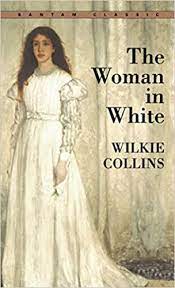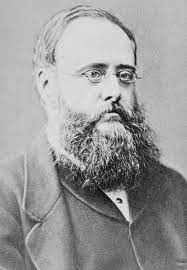The Woman in White Page #4
The Woman in White is Wilkie Collins's fifth published novel, written in 1859. It is a mystery novel and falls under the genre of "sensation novels". The story is an early example of detective fiction with protagonist Walter Hartright employing many of the sleuthing techniques of later private detectives
right-right-right-all-right!" Here the Professor waved the memorandum of terms over his head, and ended his long and voluble narrative with his shrill Italian parody on an English cheer." My mother rose the moment he had done, with flushed cheeks and brightened eyes. She caught the little man warmly by both hands. "My dear, good Pesca," she said, "I never doubted your true affection for Walter--but I am more than ever persuaded of it now!" "I am sure we are very much obliged to Professor Pesca, for Walter's sake," added Sarah. She half rose, while she spoke, as if to approach the arm-chair, in her turn; but, observing that Pesca was rapturously kissing my mother's hands, looked serious, and resumed her seat. "If the familiar little man treats my mother in that way, how will he treat ME?" Faces sometimes tell truth; and that was unquestionably the thought in Sarah's mind, as she sat down again. Although I myself was gratefully sensible of the kindness of Pesca's motives, my spirits were hardly so much elevated as they ought to have been by the prospect of future employment now placed before me. When the Professor had quite done with my mother's hand, and when I had warmly thanked him for his interference on my behalf, I asked to be allowed to look at the note of terms which his respectable patron had drawn up for my inspection. Pesca handed me the paper, with a triumphant flourish of the hand. "Read!" said the little man majestically. "I promise you my friend, the writing of the golden Papa speaks with a tongue of trumpets for itself." The note of terms was plain, straightforward, and comprehensive, at any rate. It informed me, First, That Frederick Fairlie, Esquire, of Limmeridge House. Cumberland, wanted to engage the services of a thoroughly competent drawing-master, for a period of four months certain. Secondly, That the duties which the master was expected to perform would be of a twofold kind. He was to superintend the instruction of two young ladies in the art of painting in water-colours; and he was to devote his leisure time, afterwards, to the business of repairing and mounting a valuable collection of drawings, which had been suffered to fall into a condition of total neglect. Thirdly, That the terms offered to the person who should undertake and properly perform these duties were four guineas a week; that he was to reside at Limmeridge House; and that he was to be treated there on the footing of a gentleman. Fourthly, and lastly, That no person need think of applying for this situation unless he could furnish the most unexceptionable references to character and abilities. The references were to be sent to Mr. Fairlie's friend in London, who was empowered to conclude all necessary arrangements. These instructions were followed by the name and address of Pesca's employer in Portland Place--and there the note, or memorandum, ended. The prospect which this offer of an engagement held out was certainly an attractive one. The employment was likely to be both easy and agreeable; it was proposed to me at the autumn time of the year when I was least occupied; and the terms, judging by my personal experience in my profession, were surprisingly liberal. I knew this; I knew that I ought to consider myself very fortunate if I succeeded in securing the offered employment--and yet, no sooner had I read the memorandum than I felt an inexplicable unwillingness within me to stir in the matter. I had never in the whole of my previous experience found my duty and my inclination so painfully and so unaccountably at variance as I found them now. "Oh, Walter, your father never had such a chance as this!" said my mother, when she had read the note of terms and had handed it back to me. "Such distinguished people to know," remarked Sarah, straightening herself in the chair; "and on such gratifying terms of equality too!" "Yes, yes; the terms, in every sense, are tempting enough," I replied impatiently. "But before I send in my testimonials, I should like a little time to consider----" "Consider!" exclaimed my mother. "Why, Walter, what is the matter with you?" "Consider!" echoed my sister. "What a very extraordinary thing to say, under the circumstances!" "Consider!" chimed in the Professor. "What is there to consider about? Answer me this! Have you not been complaining of your health, and have you not been longing for what you call a smack of the country breeze? Well! there in your hand is the paper that offers you perpetual choking mouthfuls of country breeze for four months' time. Is it not so? Ha! Again--you want money. Well! Is four golden guineas a week nothing? My-soul-bless-my-soul! only give it to me--and my boots shall creak like the golden Papa's, with a sense of the overpowering richness of the man who walks in them! Four guineas a week, and, more than that, the charming society of two young misses! and, more than that, your bed, your breakfast, your dinner, your gorging English teas and lunches and drinks of foaming beer, all for nothing--why, Walter, my dear good friend--deuce-what-the-deuce!--for the first time in my life I have not eyes enough in my head to look, and wonder at you!" Neither my mother's evident astonishment at my behaviour, nor Pesca's fervid enumeration of the advantages offered to me by the new employment, had any effect in shaking my unreasonable disinclination to go to Limmeridge House. After starting all the petty objections that I could think of to going to Cumberland, and after hearing them answered, one after another, to my own complete discomfiture, I tried to set up a last obstacle by asking what was to become of my pupils in London while I was teaching Mr. Fairlie's young ladies to sketch from nature. The obvious answer to this was, that the greater part of them would be away on their autumn travels, and that the few who remained at home might be confided to the care of one of my brother drawing-masters, whose pupils I had once taken off his hands under similar circumstances. My sister reminded me that this gentleman had expressly placed his services at my disposal, during the present season, in case I wished to leave town; my mother seriously appealed to me not to let an idle caprice stand in the way of my own interests and my own health; and Pesca piteously entreated that I would not wound him to the heart by rejecting the first grateful offer of service that he had been able to make to the friend who had saved his life. The evident sincerity and affection which inspired these remonstrances would have influenced any man with an atom of good feeling in his composition. Though I could not conquer my own unaccountable perversity, I had at least virtue enough to be heartily ashamed of it, and to end the discussion pleasantly by giving way, and promising to do all that was wanted of me. The rest of the evening passed merrily enough in humorous anticipations of my coming life with the two young ladies in Cumberland. Pesca,
Translation
Translate and read this book in other languages:
Select another language:
- - Select -
- 简体中文 (Chinese - Simplified)
- 繁體中文 (Chinese - Traditional)
- Español (Spanish)
- Esperanto (Esperanto)
- 日本語 (Japanese)
- Português (Portuguese)
- Deutsch (German)
- العربية (Arabic)
- Français (French)
- Русский (Russian)
- ಕನ್ನಡ (Kannada)
- 한국어 (Korean)
- עברית (Hebrew)
- Gaeilge (Irish)
- Українська (Ukrainian)
- اردو (Urdu)
- Magyar (Hungarian)
- मानक हिन्दी (Hindi)
- Indonesia (Indonesian)
- Italiano (Italian)
- தமிழ் (Tamil)
- Türkçe (Turkish)
- తెలుగు (Telugu)
- ภาษาไทย (Thai)
- Tiếng Việt (Vietnamese)
- Čeština (Czech)
- Polski (Polish)
- Bahasa Indonesia (Indonesian)
- Românește (Romanian)
- Nederlands (Dutch)
- Ελληνικά (Greek)
- Latinum (Latin)
- Svenska (Swedish)
- Dansk (Danish)
- Suomi (Finnish)
- فارسی (Persian)
- ייִדיש (Yiddish)
- հայերեն (Armenian)
- Norsk (Norwegian)
- English (English)
Citation
Use the citation below to add this book to your bibliography:
Style:MLAChicagoAPA
"The Woman in White Books." Literature.com. STANDS4 LLC, 2025. Web. 21 Jan. 2025. <https://www.literature.com/book/the_woman_in_white_1567>.




Discuss this The Woman in White book with the community:
Report Comment
We're doing our best to make sure our content is useful, accurate and safe.
If by any chance you spot an inappropriate comment while navigating through our website please use this form to let us know, and we'll take care of it shortly.
Attachment
You need to be logged in to favorite.
Log In